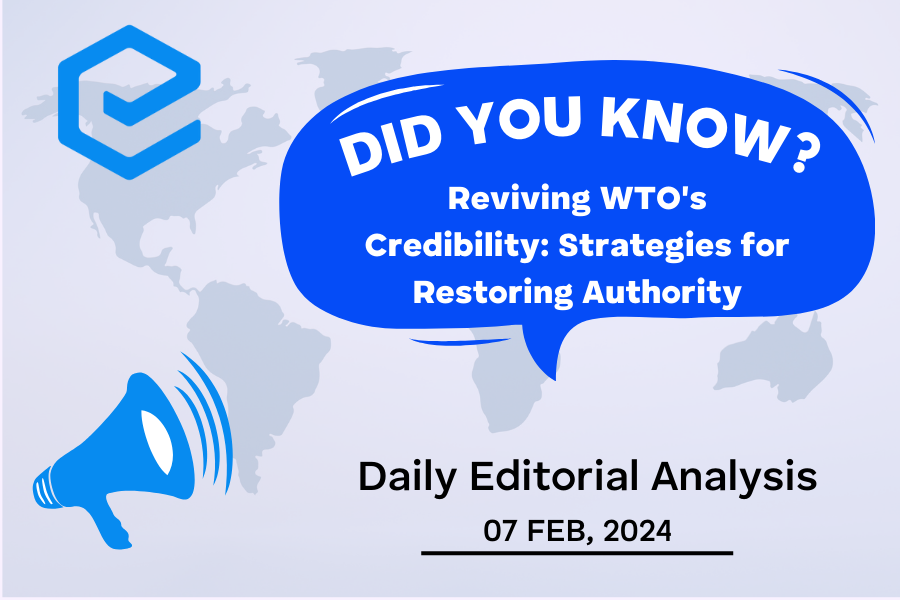
Reviving the credibility of the World Trade Organization (WTO) demands a multifaceted approach that addresses the organization’s fundamental challenges. First and foremost, rebuilding authority necessitates a concerted effort to modernize and adapt the WTO’s structures and mechanisms to the realities of the 21st century global economy. This entails reforming outdated rules and procedures to better accommodate emerging trade issues such as digital trade and climate change. Additionally, enhancing transparency and inclusivity within the organization is imperative to regain trust among member states and stakeholders. Furthermore, fostering greater cooperation and consensus-building among members is essential for the WTO to effectively fulfill its mandate as the cornerstone of the multilateral trading system. By pursuing these strategies with diligence and determination, the WTO can reclaim its position as a credible and indispensable forum for international trade negotiations and dispute resolution.
Tag: GS-2 IR
Contents
- 1 World Trade Organisation (WTO): Overview
- 2 Current Challenges in the Dispute Settlement Mechanism (DSM)
- 3 Potential Solutions for Developing Countries
- 4 Conclusion
- 5 Frequently Asked Questions (FAQs)
- 5.1 1. What specific challenges has the WTO faced in recent years regarding its credibility?
- 5.2 2. How can the WTO modernize its structures to regain authority in the international trade arena?
- 5.3 3. What role does transparency play in rebuilding trust in the WTO?
- 5.4 4. How can the WTO enhance inclusivity to strengthen its credibility?
- 5.5 5. What strategies are essential for fostering greater cooperation among WTO members?
- 6 In case you still have your doubts, contact us on 9811333901.
In News:
The upcoming 13th ministerial meeting of the World Trade Organisation (WTO) in Abu Dhabi presents a new chance to tackle the persistent crisis within the Dispute Settlement Mechanism (DSM).
World Trade Organisation (WTO): Overview
- International Trade Oversight: WTO serves as an international institution regulating global trade rules among nations.
- Membership: Currently, WTO has 164 member countries and 25 observer countries, with Liberia and Afghanistan being the latest members since 2016.
- Inception: Officially commenced operations on January 1, 1995, replacing the General Agreement on Tariffs and Trade (GATT) from 1948.
WTO Organisational Structure
- Ministerial Conference: The highest authority, meeting biennially, consisting of all member states, with a focus on consensus in decision-making.
- Daily Operations: Handled by three bodies – General Council, Dispute Settlement Body (DSB), and Trade Policy Review Body.
Significance of the Appellate Body (AB)
- Binding Decision-Making: AB reviews and potentially overturns legal findings, ensuring definitive resolution in trade disputes.
- Compulsory Jurisdiction: AB’s jurisdiction is compulsory for all WTO member countries, reinforcing a rules-based international trading system.
- Fair-Trade Practices: AB contributes to fair and equitable trade practices by enforcing compliance with WTO rules.
Current Challenges in the Dispute Settlement Mechanism (DSM)
- AB Crippling: AB’s functionality hindered due to the U.S.’ reluctance, impacting the binding nature of dispute resolution.
- Avoidance of Compliance: Countries exploit the AB’s inoperability, evading compliance with WTO panel rulings.
- Delayed Dispute Resolution: Absence of a functioning AB leads to prolonged trade dispute resolutions, causing economic uncertainties.
- Threat to Rules-Based Trade: The DSM crisis undermines the concept of a rules-based international trading system.
Potential Solutions for Developing Countries
- Joining MPIA: Developing countries can consider joining the European Union-led MPIA for appellate review, albeit with certain downsides.
- Diluted AB with Limited Powers: Proposing a diluted AB with reduced powers to address U.S. concerns, risking the DSM’s effectiveness.
- Resurrecting AB with Opt-Out Provision: Suggested resurrection of AB with an opt-out provision, allowing countries to opt out of compulsory jurisdiction, ensuring flexibility.
Conclusion
Navigating the crisis involves careful consideration, with the proposed AB resurrection providing a pragmatic compromise, balancing effectiveness and legitimacy in the international trade landscape.
Source: IE
Frequently Asked Questions (FAQs)
1. What specific challenges has the WTO faced in recent years regarding its credibility?
- The WTO has encountered challenges due to its inability to adapt swiftly to contemporary trade issues, resulting in criticism regarding its relevance and effectiveness in addressing emerging global trade challenges.
- The WTO can modernize by reforming outdated rules and procedures to better accommodate 21st-century trade issues such as digital trade and climate change, thus ensuring its relevance and effectiveness.
3. What role does transparency play in rebuilding trust in the WTO?
- Transparency is crucial for rebuilding trust as it ensures openness in decision-making processes, allowing member states and stakeholders to have confidence in the organization’s operations and objectives.
4. How can the WTO enhance inclusivity to strengthen its credibility?
- The WTO can enhance inclusivity by actively engaging with a diverse range of stakeholders, including developing countries, small and medium-sized enterprises (SMEs), civil society organizations, and non-governmental organizations (NGOs), to ensure that all voices are heard and considered in trade negotiations and policy-making processes.
5. What strategies are essential for fostering greater cooperation among WTO members?
- Strategies such as promoting dialogue, consensus-building, and compromise are essential for fostering greater cooperation among WTO members. By working together constructively, members can overcome differences and find mutually beneficial solutions to global trade challenges, thereby strengthening the credibility and effectiveness of the organization.
In case you still have your doubts, contact us on 9811333901.
For UPSC Prelims Resources, Click here
For Daily Updates and Study Material:
Join our Telegram Channel – Edukemy for IAS
- 1. Learn through Videos – here
- 2. Be Exam Ready by Practicing Daily MCQs – here
- 3. Daily Newsletter – Get all your Current Affairs Covered – here
- 4. Mains Answer Writing Practice – here

